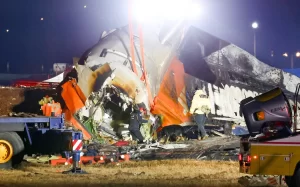Recovery Update on the Two Flight Attendants Who Survived the Jeju Air Crash
The condition of the two flight attendants who survived the Jeju Air crash remains a key point of interest as investigations and recovery efforts continue.
Physical Condition: Immediate Medical Attention
Immediately after being rescued, the two flight attendants were rushed to a nearby hospital for urgent medical treatment.
Doctors overseeing their treatment have confirmed that both individuals are stable but will require a period of rest and rehabilitation.
Emotional and Psychological Impact
Surviving a plane crash leaves deep psychological scars, and both flight attendants are receiving counseling from trauma specialists. Symptoms of post-traumatic stress disorder (PTSD) are common among crash survivors, including anxiety, recurring nightmares, and heightened stress responses.
Aviation experts stress the importance of ongoing mental health support, not just for the flight attendants but also for their colleagues and families who have been indirectly affected by the tragedy.
Heroic Efforts During the Crash
Despite the chaos and danger, they followed safety protocols, assisted passengers, and worked to maintain calm amid the panic. Their courage and professionalism played a crucial role in preventing further casualties.
Their actions serve as a testament to the rigorous training flight attendants undergo to handle emergencies effectively.
The Road to Recovery
Recovery for survivors of plane crashes extends beyond the hospital. Both flight attendants are expected to undergo extended therapy sessions and may need time before they feel ready to return to work—or, in some cases, they may choose to leave the aviation industry altogether.
Support networks, including fellow airline staff, family members, and trauma counselors, will play a significant role in helping them rebuild their confidence and sense of security.
Lessons for the Aviation Industry
This incident underscores the importance of safety drills, adequate mental health resources, and post-incident care for airline employees. Airlines worldwide are being reminded of the critical role cabin crew play not just in passenger safety but also in disaster response and recovery.
Conclusion: A Story of Survival and Resilience
The two flight attendants who survived the Jeju Air crash embody resilience, courage, and professionalism. While their physical injuries may heal in time, their emotional journey toward recovery will require patience, support, and compassion.
The aviation community, along with passengers and stakeholders, will continue to follow their story and extend support as they navigate the challenging road ahead.
Keyphrase: Condition of Jeju Air crash flight attendants
More Stories
Israel Orders Full Evacuation of Gaza City Ahead of Major Attack
The Israeli military has officially ordered the evacuation of the entire Gaza City in preparation for a large-scale military assault....
Spain to Ban Israeli Cargo Ships and Planes from Entering Its Territory
In a major shift in international relations, Spain has announced that it will be blocking Israeli cargo ships and planes...
Putin: Western Soldiers Are Legitimate Targets If They Enter Ukraine
IntroductionIn a shocking statement, Russian President Vladimir Putin declared that any Western soldiers entering Ukraine will be considered legitimate military...
📰 Escalating Violence: Israel Airstrikes Destroy High-Rise Buildings in Gaza City
▶ Brutal Strikes Target Civilian Infrastructure According to local sources and international media, Israeli fighter jets launched a series of...
Coinbase Executive Warns Bitcoin Could Explode Like the South Sea Bubble
In a striking statement that has stirred debate across the crypto industry, a senior executive at Coinbase Asset Management has...
Gemini Crypto Firm Aims for $2.3 Billion Valuation with IPO Plans
Gemini, one of the leading cryptocurrency exchanges, is setting its sights on a massive $2.3 billion valuation as it prepares...

